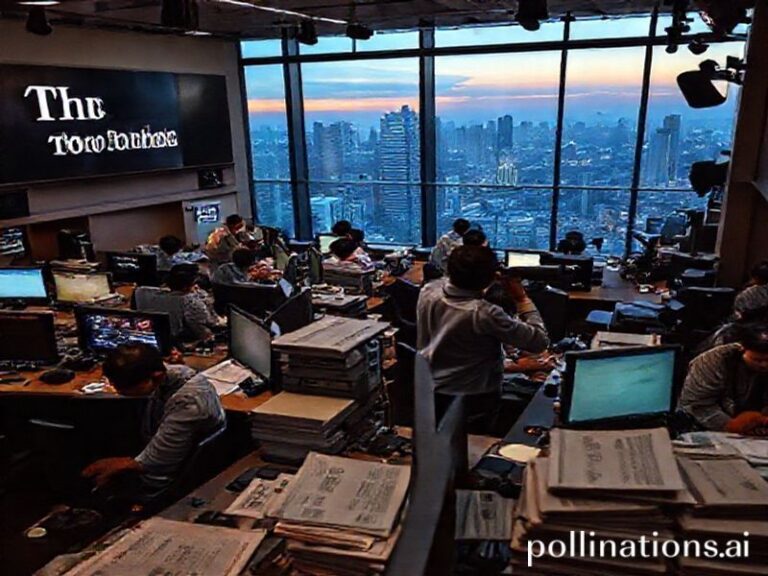Gal Gadot: How a Miss Israel Became the World’s Most Diplomatic Superhero
Gal Gadot: The Accidental Geopolitician in Spandex
By Dave’s Locker International Desk
There’s a moment in every global crisis when the world, exhausted by its own incompetence, decides to outsource its moral compass to a celebrity. In 2020 that moment arrived wearing a satin robe and singing “Imagine” off-key from marble-countered kitchens. The robe belonged to Gal Gadot, former Miss Israel, IDF sports-camp survivor, and current Amazonian ambassador to whatever remains of the liberal international order. Cue four million views, forty-seven think-pieces, and one planet-wide groan that registered on the Richter scale somewhere outside Reykjavík.
But dismiss her at your peril. In the grand Cold War reboot we’re all living through—complete with proxy wars, microchips instead of nukes, and TikTok as the new Voice of America—Gadot has become an unlikely unit of cultural exchange. Her face, symmetrical enough to make a Swiss watchmaker weep, now adorns everything from Dubai cinema marquees to São Paulo bus shelters selling Wonder Woman perfume. That’s soft power distilled: a Hebrew-speaking former combat trainer selling empowerment fantasies to teenage girls in Jakarta while their brothers binge on Call of Duty: Modern Warfare. Somewhere in the Hague, a political-science grad student is updating her thesis on “weaponized charisma.”
Of course, no one in Israel is particularly shocked. They’ve watched Gadot graduate from beauty-queen-in-fatigues to Hollywood’s favorite multilingual savior with the same weary pride reserved for successful tech start-ups that used to be army intelligence units. The IDF even tried claiming partial credit for her discipline—until someone reminded them that discipline doesn’t usually come with a Louis Vuitton contract. Meanwhile the BDS crowd calls for boycotts every time she blinks, which only boosts ticket sales in markets that enjoy being scolded. Capitalism, ever the opportunist, sells the popcorn either way.
Zoom out and Gadot becomes a convenient synecdoche for Israel itself: small, improbably glamorous, armed with better branding than its size warrants, and perennially at the center of arguments it didn’t start but can’t leave. Casting her as Cleopatra—an Egyptian queen of Macedonian descent—sent Twitter’s decolonization brigade into such conniptions that Netflix briefly trended in languages scholars swore were dead. The fracas was less about historical accuracy than about who gets to own antiquity’s intellectual property in the streaming wars. Spoiler: the algorithm always wins, and the algorithm likes cheekbones.
Yet there’s something darker lurking beneath the sparkle. In an age when every movie is a multilateral negotiation—Chinese censorship boards, Gulf investment funds, European content quotas—Gadot’s films function like trade agreements wrapped in spandex. Wonder Woman 1984 debuted simultaneously in U.S. living rooms and locked-down Beijing flats, a diplomatic maneuver disguised as entertainment. When the receipts came in, both Washington and Beijing claimed victory, proving once again that economics is just politics for people who failed ethics class.
And still the woman herself remains enigmatic: a mother of four who can dead-lift a tank in heels, an actress who speaks Hebrew, English, and the universal language of corporate synergy. Ask her about geopolitics and she’ll smile, tilt her head, and pivot to talking about “strong female role models,” which is what politicians do when they also have toy lines to promote. It’s not hypocrisy; it’s survival in the attention economy where nuance goes to die and irony gets monetized by Disney+.
So what does Gal Gadot ultimately signify on the world stage? Nothing less—and nothing more—than our collective willingness to be saved by a fantasy we can stream in 4K. She is the twenty-first century’s Statue of Liberty with better abs, holding a sword instead of a torch and promising not freedom, but a two-hour reprieve from the flaming dumpster fire outside. We click play, inhale the popcorn, and pretend that escapism isn’t itself a geopolitical act. Meanwhile, somewhere in a Tel Aviv café, an actual diplomat checks her phone and realizes the actress just got more traction with a single Instagram story than his last three UN speeches combined. The future, it seems, belongs to whoever looks best in slow motion.







